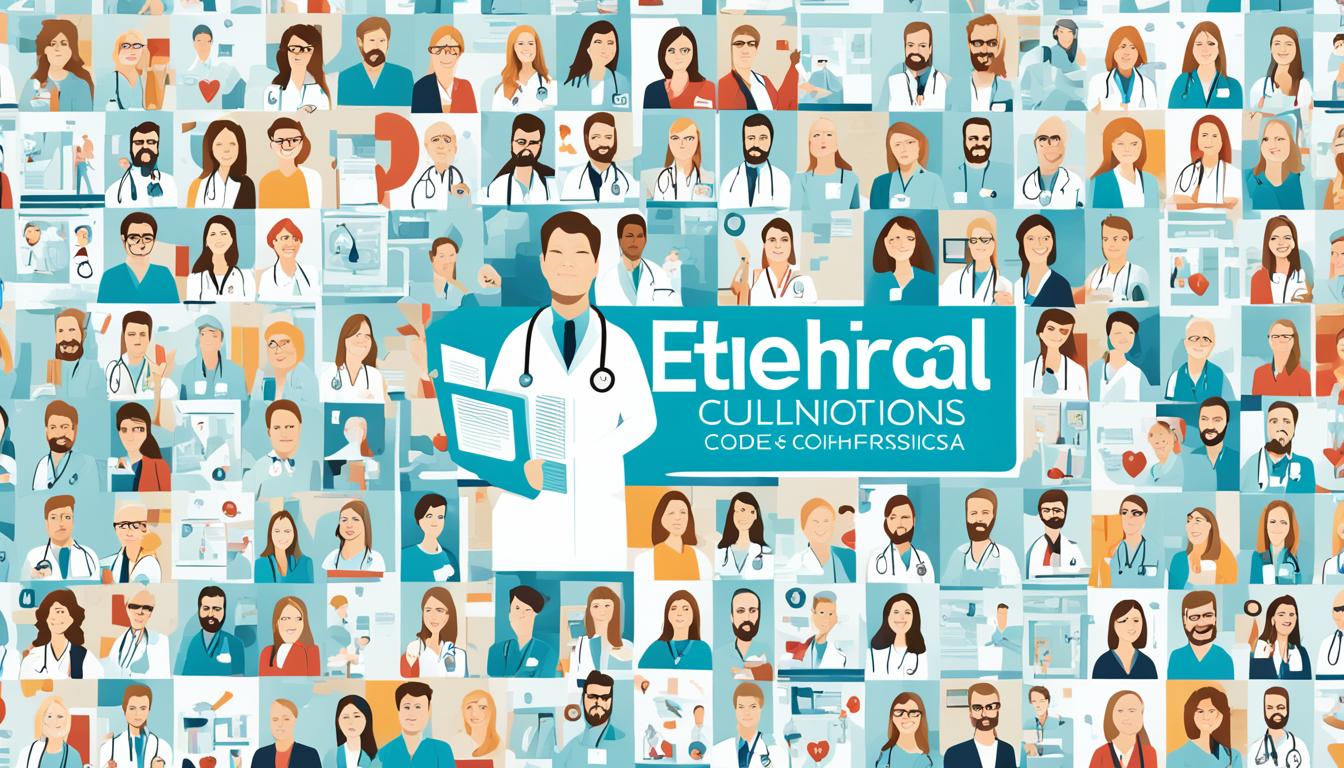Medical ethics and healthcare decision-making are essential components of providing ethical healthcare practices. In a rapidly evolving healthcare landscape, it is crucial to prioritize patient autonomy and uphold ethical principles throughout the medical decision-making process. From obtaining informed consent to addressing complex ethical dilemmas, healthcare providers navigate a range of ethical considerations to ensure patient-centered care. Let’s explore the key aspects of medical ethics in healthcare and how they shape the ethical practices in genetic information and privacy.
Key Takeaways:
- Medical ethics and healthcare decision-making are essential for ethical healthcare practices.
- Patient autonomy is a guiding principle that empowers individuals in making informed decisions about their healthcare.
- Informed consent ensures that patients have the necessary information to make informed choices.
- Healthcare ethics principles and medical ethics guidelines provide a framework for ethical decision-making.
- A healthcare ethics committee supports the resolution of complex ethical dilemmas.
Understanding Medical Ethics in Healthcare
Medical ethics plays a fundamental role in guiding healthcare decision-making. It encompasses the moral, professional, and legal principles that shape the way healthcare providers care for their patients. Ethical considerations are crucial in ensuring that medical practices, research, and policies uphold the highest standards of care.
Ethical decision-making in healthcare involves carefully weighing the benefits, risks, and implications of different options to ensure the best interests of patients. This process entails considering the patient’s autonomy, their values and preferences, and the ethical implications of various courses of action. It is a complex and delicate task that requires healthcare professionals to navigate potential ethical dilemmas and make decisions that prioritize the welfare of their patients.
Healthcare ethics provides a framework that guides healthcare professionals in their decision-making processes. It offers a set of moral guidelines and principles that serve as a compass in navigating the complexities and uncertainties of healthcare. By adhering to these principles, healthcare providers can ensure ethical care delivery and promote patient-centered decision-making.
The Key Elements of Medical Ethics
Medical ethics encompasses various key elements that shape ethical decision-making in healthcare:
- Beneficence: The principle of beneficence requires healthcare providers to act in the best interests of their patients, prioritizing their wellbeing and promoting positive outcomes.
- Nonmaleficence: The principle of nonmaleficence emphasizes the importance of avoiding harm or minimizing potential risks to patients.
- Justice: Justice calls for a fair distribution of healthcare resources and the equitable provision of care.
- Respect for Autonomy: The principle of respect for autonomy recognizes the rights of patients to make informed decisions about their healthcare and have their preferences and values respected.
By understanding and applying these ethical principles, healthcare providers can navigate the complexities of healthcare decision-making and ensure that their actions align with ethical standards and patient-centered care.
“Medical ethics provides a roadmap for healthcare professionals to navigate complex decisions and address potential ethical dilemmas.”
The Role of Healthcare Ethics Committees
Healthcare ethics committees play a vital role in supporting healthcare professionals in their ethical decision-making processes. These committees consist of healthcare providers, ethicists, legal experts, and community representatives who collaborate to provide guidance and insights on ethical issues in healthcare.
They conduct case reviews, offer ethical consultations, and develop policies and guidelines to help healthcare professionals navigate complex ethical dilemmas. Healthcare ethics committees serve as invaluable resources, promoting the application of ethical principles and ensuring that the highest standards of care are upheld.
| Key Concepts | Definition |
|---|---|
| Medical Ethics | The moral, professional, and legal principles that guide healthcare decision-making. |
| Healthcare Decision-Making | The process of making choices about healthcare options for patients, considering their best interests and ethical considerations. |
| Ethics in Healthcare | The application of ethical principles and guidelines in healthcare settings. |
| Medical Decision-Making | The process of making decisions related to medical treatments or interventions. |
| Ethical Decision-Making in Healthcare | The process of making choices in healthcare that prioritize ethical considerations and patient welfare. |
| Healthcare Ethics | The principles and guidelines that provide the ethical framework for healthcare professionals. |
Patient Autonomy and Informed Consent
In the realm of medical ethics and healthcare decision-making, patient autonomy and informed consent are pivotal components that uphold individuals’ rights and facilitate the medical decision-making process. Patient autonomy is the fundamental principle that recognizes an individual’s right to make decisions about their own healthcare, ultimately empowering patients to become active participants in their treatment plans and ensuring that their values and preferences are respected.
Essential to patient autonomy is the concept of informed consent, which serves as the cornerstone of ethical medical practice. Informed consent involves providing patients with comprehensive information regarding their diagnosis, available treatment options, potential risks and benefits, and any alternative courses of action. By ensuring that patients are well-informed, healthcare providers enable them to make knowledgeable choices that align with their personal values and goals.
When obtaining informed consent, healthcare professionals must adopt clear and effective communication strategies to ensure patients have a comprehensive understanding of their situation. This includes explaining complex medical terminology in an accessible manner, addressing any questions or concerns patients may have, and presenting information in a manner that respects their individual learning styles and preferences.
The process of informed consent extends beyond a one-time conversation; rather, it represents an ongoing dialogue between patients and healthcare providers. As patients’ understanding and circumstances may evolve throughout their healthcare journey, it is crucial for healthcare providers to continuously engage in open and transparent communication, allowing patients to make informed decisions at each stage of their treatment.
“Patient autonomy and informed consent are fundamental pillars that uphold patients’ rights and promote patient-centered care. By empowering individuals with comprehensive information and involving them in decision-making, healthcare providers ensure that patients have an active role in determining their own healthcare.”
By adhering to the principles of patient autonomy and informed consent, healthcare professionals establish a supportive and collaborative relationship with their patients. This approach fosters trust, enhances patient satisfaction, and ultimately leads to better healthcare outcomes.
In the next section, we will explore the essential healthcare ethics principles and guidelines that provide a framework for ethical decision-making in healthcare.

Healthcare Ethics Principles and Guidelines
Healthcare ethics principles serve as the cornerstone for ethical decision-making in the healthcare industry. These principles provide healthcare professionals with a framework to navigate complex situations and ensure that ethical considerations are prioritized in their decision-making process. Some common healthcare ethics principles include:
- Beneficence: Acting in the best interest of patients and promoting their well-being.
- Nonmaleficence: Avoiding harm to patients and minimizing potential risks.
- Justice: Ensuring fair distribution of healthcare resources and equitable access to care.
- Respect for autonomy: Recognizing and upholding the right of patients to make informed decisions about their healthcare.
These principles guide healthcare professionals in their commitment to delivering ethical care and improving patient outcomes.
In addition to healthcare ethics principles, there are specific guidelines that outline ethical practices in the medical field. These medical ethics guidelines offer detailed recommendations on various aspects of healthcare, including:
- Maintaining patient confidentiality and privacy
- Avoiding conflicts of interest
- Addressing ethical dilemmas
- Promoting professionalism and integrity
Adhering to these guidelines safeguards patient rights, fosters trust, and upholds the integrity of the healthcare profession.
By integrating healthcare ethics principles and following medical ethics guidelines, healthcare professionals can navigate complex ethical scenarios, promote patient-centered care, and ensure that ethical considerations are at the forefront of their decision-making process.
| Principle | Description |
|---|---|
| Beneficence | Acting in the best interest of patients and promoting their well-being. |
| Nonmaleficence | Avoiding harm to patients and minimizing potential risks. |
| Justice | Ensuring fair distribution of healthcare resources and equitable access to care. |
| Respect for autonomy | Recognizing and upholding the right of patients to make informed decisions about their healthcare. |
Note: This table summarizes the healthcare ethics principles discussed above.
The Role of Healthcare Ethics Committees
Healthcare ethics committees play a crucial role in supporting healthcare professionals, patients, and their families in navigating ethical dilemmas. These committees bring together experts from various disciplines including healthcare providers, ethicists, legal experts, and representatives from the community.
**Guidance**, **consultation**, and **education** on ethical issues are among the key services provided by healthcare ethics committees. They offer **insightful guidance** based on ethical principles and practical experience, helping healthcare professionals make informed decisions that align with ethical standards.
Furthermore, healthcare ethics committees contribute to **policy development** by analyzing ethical implications and recommending guidelines that ensure ethical practices are followed. Their perspective is crucial in shaping healthcare policies that prioritize patient rights and well-being.
**Case reviews** are another important function of healthcare ethics committees. They engage in **in-depth analysis** of complex ethical challenges presented by specific cases, offering a valuable forum for discussing various perspectives and arriving at ethical decisions.
In addition to their direct impact on decision-making processes, healthcare ethics committees play a vital role in promoting a culture of ethical awareness and accountability within healthcare organizations. By providing **ongoing education and training**, they help healthcare professionals stay updated on ethical considerations and promote ethical practices in their day-to-day work.
A healthcare ethics committee ensures that ethically significant aspects are addressed in complex decision-making processes, ultimately **ensuring the best possible outcomes** for patients. Their expertise and collaborative approach make them essential in upholding the values and principles of ethically sound healthcare.

Benefits of Healthcare Ethics Committees:
| Guidance and Consultation | Policy Development | Case Reviews | Education and Training |
|---|---|---|---|
| Offers expert guidance on ethical issues | Contributes to policy development based on ethical considerations | Engages in in-depth analysis of complex ethical challenges | Provides ongoing education and training on ethical practices |
| Assists healthcare professionals in ethical decision-making | Recommends guidelines for ethical practices | Offers a forum for discussing ethical perspectives | Promotes ethical awareness and accountability |
Addressing Ethical Dilemmas in Healthcare
Ethical dilemmas frequently emerge in the healthcare industry when there is a clash of values, interests, or principles. These dilemmas encompass a wide range of situations, including end-of-life decision-making, resource allocation, genetic testing, privacy and confidentiality concerns, and conflicts between patient autonomy and beneficence.
Healthcare providers and ethics committees collaborate closely to navigate these challenging dilemmas. They engage in meticulous ethical analysis, meticulously weighing the pros and cons of various options, and taking into account the ethical principles and guidelines that should shape decision-making.
End-of-life decision-making poses one of the most difficult ethical dilemmas in healthcare. Balancing the desire to preserve life and alleviate suffering while respecting the autonomy and dignity of the patient requires thoughtful consideration and communication among all parties involved.
Resource allocation is another complex ethical challenge. With limited resources and increasing demands, healthcare providers must make difficult decisions about how to allocate resources equitably to maximize benefit for the greatest number of patients.
Genetic testing raises ethical concerns related to privacy and confidentiality. As technology advances, the ability to obtain and analyze genetic information expands. Healthcare providers must grapple with how to ensure patient privacy and confidentiality while utilizing genetic data to improve diagnosis and treatment.
Conflicts may also arise when patient autonomy clashes with the principle of beneficence. Ethical dilemmas can arise when a patient desires a particular treatment that may not align with the healthcare provider’s judgment of what is best for their overall well-being.
“The ethical dilemmas encountered in healthcare require careful consideration and respectful dialogue among all stakeholders involved. By collaborating and utilizing ethical principles and guidelines, healthcare providers and ethics committees can navigate these challenges and find morally sound solutions.”
Some of these ethical dilemmas can be resolved through open and transparent communication, involving all relevant parties in the decision-making process. Engaging in a shared decision-making approach and respecting the values and perspectives of all involved can help navigate complex ethical dilemmas.
The Role of Ethics Committees
Healthcare ethics committees play a vital role in addressing ethical dilemmas. These committees bring together diverse perspectives, including healthcare professionals, ethicists, legal experts, and community representatives, to provide guidance, consultation, and education on ethical issues. They offer a valuable forum for discussing and resolving complex ethical challenges, ensuring that ethical considerations are at the forefront of decision-making.
By actively engaging in ethical analysis, healthcare providers can strive to make well-informed and morally responsible decisions that prioritize the best interests of patients and uphold the principles of ethical healthcare practices.
The Importance of Patient-Centered Care
Patient-centered care is an ethical approach that prioritizes the needs, values, and preferences of patients in healthcare decision-making. It recognizes that patients are experts in their own experiences and involves actively involving them in their care. This approach emphasizes collaboration, empathy, and shared decision-making between healthcare providers and patients.
Patient-centered care aims to improve patient satisfaction, outcomes, and overall quality of care by ensuring that the patient’s voice is heard and respected throughout the healthcare journey. By actively involving patients in the decision-making process, healthcare providers can gain a better understanding of their unique needs and preferences, allowing for more personalized and tailored treatment plans.
Patient-centered care is about treating the whole person, not just the symptoms. It involves building a trusting and collaborative relationship between the patient and healthcare provider. Through open communication and shared decision-making, patients feel empowered and respected, leading to improved health outcomes.
In a patient-centered care model, healthcare providers take into account not only the medical aspect of a patient’s condition but also their emotional, psychological, and social needs. This holistic approach ensures that patients receive comprehensive care that addresses all aspects of their well-being. It recognizes that healthcare is not a one-size-fits-all approach and that every patient is unique, requiring personalized care that considers their individual circumstances.
Benefits of Patient-Centered Care
The benefits of patient-centered care extend beyond patient satisfaction. It has been shown to improve treatment adherence, reduce healthcare disparities, and enhance patient safety. When patients are actively involved in their care, they are more likely to adhere to treatment plans, leading to better health outcomes.
- Improved treatment adherence
- Reduced healthcare disparities
- Enhanced patient safety
Furthermore, patient-centered care promotes a positive patient-provider relationship, fostering trust, and improving communication. This, in turn, leads to better patient engagement and greater patient satisfaction. Patients who feel heard, respected, and valued are more likely to have a positive healthcare experience and form long-lasting partnerships with their healthcare providers.

Ensuring Ethical Practices in Genetic Information and Privacy
With the increasing prevalence of genetic testing and personalized medicine, it is essential to address the ethical considerations surrounding genetic information and privacy. Healthcare providers bear the responsibility of safeguarding the confidentiality and privacy of patients’ genetic information, ensuring that it remains secure and protected from unauthorized access.
Obtaining informed consent from patients holds paramount importance in upholding ethical practices. Patients must be fully informed about the potential risks, benefits, and implications associated with genetic testing, allowing them to make well-informed decisions about their healthcare. Respecting patients’ autonomy and privacy rights ensures that they retain control over how their genetic data is utilized.
Ethical guidelines serve as a guiding compass for healthcare providers when dealing with genetic information. These guidelines outline best practices for proper handling and storage of genetic data, ensuring its anonymization and protection. By adhering to these guidelines, healthcare providers can promote responsible use of genetic information while safeguarding patient privacy.
To strike a balance between the potential benefits of genetic testing and the ethical implications regarding privacy and discrimination, it is essential to foster open and transparent discussions. These conversations should involve patients, healthcare providers, researchers, ethicists, and policymakers. By engaging in meaningful dialogue, stakeholders can collectively navigate the ethical dimensions surrounding genetic information and privacy.
“Ethical practices in handling genetic information are crucial not only for maintaining patient trust but also for advancing the field of personalized medicine.”
By implementing robust privacy policies, adopting secure technologies, and ensuring adherence to ethical guidelines, healthcare providers can cultivate a culture of trust, accountability, and ethical decision-making in the realm of genetic information and privacy.
Data Ownership and Consent
One of the key ethical concerns in genetic testing lies in determining data ownership and patients’ control over their genetic information. Healthcare providers must obtain explicit consent from patients for the collection, storage, and use of their genetic data. This consent should be informed, voluntary, and revocable, ensuring that patients maintain autonomy over their genetic information.
Creating a transparent process that details how patients’ genetic data will be used, shared, and protected builds trust and promotes ethical practices. Healthcare providers should communicate clearly with patients, providing them with comprehensive information about their rights, the potential uses of their genetic data, and any associated risks or benefits.
Protection against Unauthorized Access
Confidentiality and data security are paramount when handling genetic information. Healthcare providers need robust systems and protocols in place to safeguard patient data from unauthorized access, breaches, and misuse.
Utilizing secure storage systems, encrypting data, and implementing strict access controls can significantly enhance privacy protection. By proactively monitoring and auditing systems, healthcare providers can detect and respond to any potential privacy breaches promptly.
Addressing Ethical Dilemmas and Inequality
Genetic information poses unique ethical dilemmas, including potential discrimination, stigmatization, and the potential for unequal access to healthcare. Healthcare providers must address these challenges and ensure equitable care for all patients.
Awareness and education on the ethical implications of genetic information, both among healthcare professionals and the wider community, are crucial. By fostering a deeper understanding of the ethical dimensions surrounding genetic testing, healthcare providers can promote fairness, justice, and equality in healthcare.
| Ethical Considerations | Key Recommendations |
|---|---|
| Data privacy and confidentiality | Adhere to robust security measures, encryption protocols, and access controls to protect genetic data from unauthorized access. |
| Informed consent | Ensure that patients receive comprehensive information about their genetic testing options, potential risks and benefits, and their rights to control their genetic data. |
| Transparency | Foster open and transparent communication with patients, detailing how their genetic data will be used, shared, and protected. |
| Equality and fairness | Promote awareness and education on the ethical implications of genetic testing to address potential discrimination and disparities in healthcare. |
The Future of Medical Ethics and Healthcare Decision-Making
As the field of medical ethics and healthcare decision-making continues to evolve, it is essential for healthcare professionals, policymakers, and researchers to anticipate the future implications and challenges. Advancements in technology, such as AI and machine learning, hold significant potential in transforming the healthcare landscape. These breakthroughs bring forth new ethical considerations that require careful examination and ongoing discussion.
One area that will see tremendous progress is personalized medicine. With advancements in genomic research, healthcare providers will have access to an individual’s unique genetic information to tailor treatments and interventions specifically to their needs. However, this raises ethical questions regarding the privacy and confidentiality of genetic data, as well as potential issues of genetic discrimination.
Data privacy is another crucial aspect that will heavily influence the future of medical ethics. As more healthcare information is digitized and shared electronically, ensuring the security and privacy of patient data will be paramount. Striking the right balance between utilizing patient data for research and maintaining patient confidentiality will be a key challenge for healthcare decision-makers.
“The future of medical ethics and healthcare decision-making lies in our ability to adapt to technological advancements while upholding ethical principles and patient rights.” – Dr. Sarah Johnson, Ethics Consultant
Emerging technologies like AI and machine learning have the potential to revolutionize healthcare decision-making processes. However, ethical concerns regarding the use of AI algorithms and their potential biases must be addressed. Ensuring transparency and fairness in algorithmic decision-making will be crucial in maintaining public trust and ethical practices.
The Role of Research and Collaboration
Continued research and collaboration between healthcare professionals, ethicists, policymakers, and technologists are vital to navigating the future ethical landscape. Interdisciplinary dialogue and cooperation will help identify and address emerging ethical challenges in a timely and effective manner.
The development and regular updates to ethical guidelines will play a central role in guiding healthcare decision-making in the future. These guidelines should reflect the changing landscape of medical ethics and incorporate evolving societal values, technological advancements, and patient preferences.
The Importance of Education and Ethical Training
Education and training will also be critical in preparing healthcare professionals for the future ethical dilemmas they may encounter. Ethical decision-making skills must be honed through comprehensive training programs that explore medical ethics in an ever-evolving healthcare ecosystem.
“To ensure optimal healthcare outcomes in the future, we must prioritize ethically competent healthcare professionals who can navigate new ethical challenges with confidence and compassion.” – Dr. Michael Patel, Ethicist
By fostering a culture of ethical awareness and providing ongoing education, healthcare organizations can equip their staff with the necessary tools and knowledge to make informed decisions, ensuring patient-centered care in all dimensions.
As the future unfolds, maintaining the highest ethical standards in medical practice and healthcare decision-making will continue to be of utmost importance. By proactively addressing emerging ethical issues, promoting interdisciplinary collaboration, and prioritizing ethical education and training, healthcare professionals can pave the way for ethical advancements and provide the best possible care for their patients.

The Impact of Medical Ethics on Healthcare Outcomes
Medical ethics plays a significant role in influencing healthcare outcomes. When healthcare providers prioritize ethical principles and guidelines, it has a direct positive impact on patient trust, satisfaction, and engagement in their care. Additionally, ethical practices help to prevent medical errors, improve communication between healthcare professionals and patients, and foster a patient-centered approach.
By considering ethical considerations in healthcare decision-making, healthcare providers can ensure that patients receive the best possible care and achieve better health outcomes. This includes upholding patient autonomy, respecting their values and preferences, and involving them in the decision-making process. When patients feel respected and empowered, they are more likely to actively participate in their own care, leading to improved treatment adherence and overall health outcomes.
“Ethical practices in healthcare not only enhance patient well-being but also promote trust and collaboration between healthcare providers and patients.”
Moreover, a patient-centered approach guided by medical ethics fosters a strong therapeutic alliance. By valuing the patient’s perspectives and involving them as partners in their care, healthcare providers can gain a deeper understanding of their unique needs and concerns. This leads to tailored care plans that address the individual’s specific goals and preferences. Consequently, healthcare outcomes are optimized, as patients are more likely to adhere to treatment recommendations and actively engage in managing their own health.
The Role of Communication
Effective communication is a vital component of ethical healthcare practices and contributes significantly to positive healthcare outcomes. Open and honest communication between healthcare providers and patients helps to establish trust and foster a cooperative relationship. It allows patients to have a clear understanding of their medical conditions, treatment options, and potential risks and benefits, enabling them to make informed decisions about their care. When patients feel well-informed and involved, they are more likely to adhere to their treatment plans and actively participate in their recovery.
Ensuring Ethical Practices in Research
Research ethics is another essential aspect of medical ethics that impacts healthcare outcomes. Ethical research practices ensure the protection of participants’ rights and welfare, as well as the reliability and validity of research findings. By adhering to ethical guidelines, healthcare professionals contribute to the generation of accurate and meaningful evidence for clinical decision-making. This evidence-based practice ultimately leads to improved healthcare outcomes for patients by informing the development of effective treatments, interventions, and healthcare policies.
| Ethical Considerations | Impact on Healthcare Outcomes |
|---|---|
| Respecting patient autonomy | Empowering patients to actively participate in their care and make informed decisions |
| Preventing medical errors | Enhancing patient safety and reducing adverse events |
| Fostering a patient-centered approach | Improving treatment adherence and overall patient satisfaction |
| Promoting open and honest communication | Establishing trust, improving patient-provider relationships, and enhancing healthcare outcomes |
| Ensuring ethical practices in research | Generating reliable evidence for evidence-based healthcare decisions |

Overall, medical ethics plays a vital role in shaping healthcare outcomes. By prioritizing ethical considerations, healthcare providers can enhance patient trust, engagement, and satisfaction, while also preventing medical errors. The patient-centered approach and effective communication fostered by medical ethics contribute to better treatment adherence and improved healthcare outcomes. Additionally, ethical research practices ensure the generation of reliable evidence, enhancing evidence-based healthcare decision-making. Therefore, upholding medical ethics is essential in delivering high-quality care and achieving positive healthcare outcomes.
The Role of Education and Training in Ethical Healthcare Practices
Education and training are essential components in promoting and upholding ethical healthcare practices. Healthcare professionals need to receive comprehensive training on medical ethics to develop a deep understanding of ethical principles, informed consent processes, and how to navigate complex ethical dilemmas effectively.
Continuous education ensures that healthcare professionals stay updated with the latest ethical guidelines and advancements in healthcare practices. Ongoing discussions and engagement in ethical discourse help raise awareness of ethical issues and foster a culture of ethical decision-making within healthcare organizations.
“Education is the most powerful weapon which you can use to change the world.”
– Nelson Mandela
Through education and training, healthcare professionals gain the necessary knowledge and skills to make ethically sound decisions in their practice, ensuring the delivery of ethical healthcare services to patients. It empowers them to navigate challenging ethical dilemmas, balancing the best interests of patients with legal, professional, and moral obligations.
Educational Objectives for Ethical Healthcare Practices
The educational curriculum for medical ethics should focus on achieving the following objectives:
- Understanding major ethical principles and values in healthcare to guide decision-making processes.
- Building awareness of legal and regulatory frameworks that govern healthcare ethics.
- Developing skills in communicating complex ethical concepts with patients, families, and interdisciplinary healthcare teams.
- Learning to navigate ethical dilemmas through critical thinking, analysis, and considering multiple perspectives.
- Examining real-life case studies and ethical scenarios to enhance ethical decision-making abilities.
- Emphasizing patient-centered care and respecting patient autonomy in the decision-making process.
Continuing Education and Ethical Growth
Educational efforts should not stop after initial training but should continue throughout a healthcare professional’s career. Continuing education programs, workshops, and seminars provide opportunities for learning and self-reflection, allowing healthcare professionals to stay up-to-date with ethical guidelines, emerging ethical issues, and advancements in healthcare technology.
Ethical growth requires healthcare professionals to engage in regular self-assessment and be open to feedback and constructive criticism. It involves self-reflection, identifying areas for improvement, and actively seeking resources and educational opportunities that enhance ethical competence.
Infographic: Importance of Education and Training in Ethical Healthcare Practices

Educational Institutions and Ethical Healthcare Organizations
Colleges, universities, and healthcare organizations have a shared responsibility to prioritize education and training in ethical healthcare practices. Collaborative efforts between educational institutions and healthcare organizations can shape a culture of ethical awareness and provide opportunities for learners to apply ethical principles in various healthcare settings.
| Educational Institutions | Healthcare Organizations |
|---|---|
| Offer comprehensive medical ethics courses as part of the curriculum | Provide ongoing ethics training for healthcare staff |
| Facilitate discussions on ethically challenging case scenarios | Establish institutional ethics committees to address ethical dilemmas |
| Encourage research and publication on ethical healthcare practices | Promote a culture of ethical decision-making at all levels of the organization |
In conclusion, education and training are essential in fostering ethical healthcare practices. By equipping healthcare professionals with the necessary knowledge, skills, and ethical competencies, education contributes to the delivery of safe, patient-centered care that upholds the highest ethical standards.
Conclusion
Medical ethics and healthcare decision-making are crucial in ensuring ethical healthcare practices. By prioritizing patient autonomy and obtaining informed consent, healthcare providers can uphold ethical standards in patient care. Adhering to healthcare ethics principles and guidelines provides a framework for navigating complex ethical dilemmas. Furthermore, healthcare ethics committees, patient-centered care, and continuous education and training support healthcare professionals in making ethical decisions.
As the field of healthcare evolves, it is important to address emerging ethical challenges. The increasing use of technology and the collection of genetic information present new concerns regarding privacy and discrimination. By considering the ethical implications of these advancements and ensuring patient-centered practices, healthcare providers can maintain trust and positive healthcare outcomes.
In conclusion, a commitment to medical ethics and ongoing ethical reflection ensures that patients receive compassionate, informed, and ethical care. By navigating the complex landscape of genetic information and privacy with integrity and respecting patient autonomy, healthcare providers contribute to the overall well-being of individuals and society as a whole.
